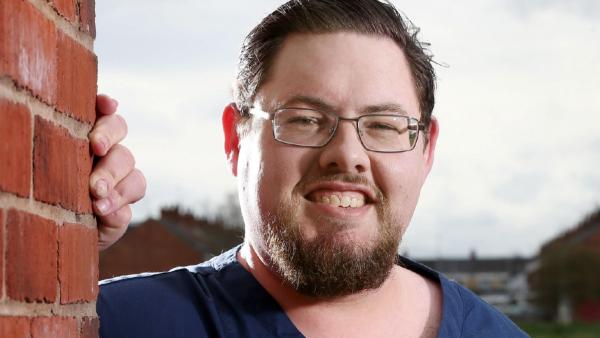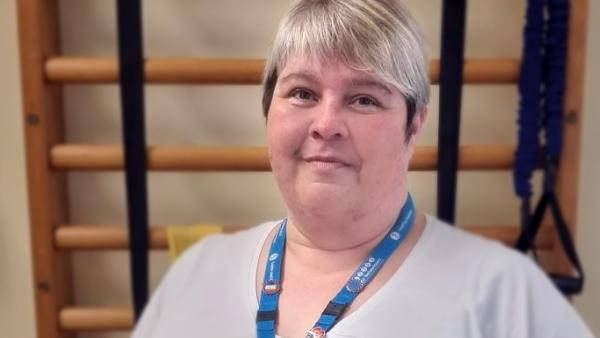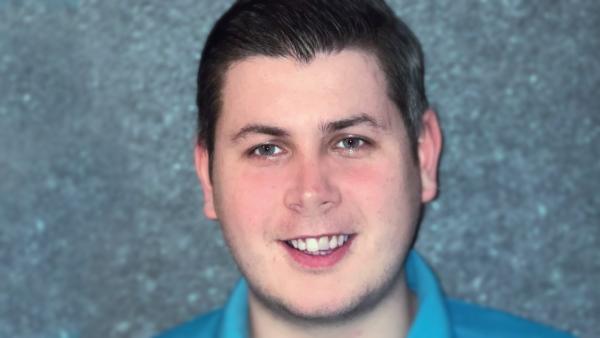There are many reasons that support workers will have had to work hard to overcome barriers to progress in their careers. Gary Henson reports

Career Progression
What are the issues support workers face in progressing their careers and the barriers they routinely face?
We showcase individuals who’ve both achieved and overcome their own personal hesitation and built their confidence.
They include those who, despite the odds, have qualified as a physiotherapist, are leading the AHP support workforce in their trusts and are undertaking management qualifications.
Our Associate members explain the key problems and barriers that need to be addressed in order to unblock the career path for support workers. Their stories also show how they’ve been supported to build confidence, skills and experience, how they’ve taken on additional responsibility and how despite challenges they have pushed forward with their careers.
Olufunmilayo Oludare, Interim lead AHP support worker, North East London NHS Trust
A community rehabilitation assistant practitioner within an integrated care team of a physiotherapist, occupational therapist, psychologist, community matrons and district nurses, Olufunmilayo Oludare assists in providing assessment for patients and in delivering progressive rehabilitation programmes.

One of the challenges working as a rehabilitation assistant in a generic therapy role, is an unclear career pathway progression.
‘That results in complexity in building a defined ambition – it was difficult for me to figure out which career pathway to choose.’
Her role aligns with physiotherapy and occupational therapy.
‘I chose physiotherapy and joined the CSP as an Associate member to enhance my knowledge.
‘Accessing Frontline and online CSP resources have empowered me and keep me informed of evidence-based practice on community rehabilitation.’
However, with a career aspiration to become a registered physiotherapist Oludare faced an inability to evidence the science subject criteria – biology and chemistry – which is a prerequisite to study for a physiotherapy degree. She ended up taking the occupational therapy pathway and is now undertaking an apprenticeship to become a registered OT.
She describes initial challenges she faced working part time hours when she started her apprenticeship programme, which was below the required 30 hours recommended by Education and Skills Funding Agency rules for apprenticeships.
‘Also, I started my apprenticeship during the first hit of Covid, which impacted negatively on everything.’
Oludare also describes the support she got to overcome these challenges: ‘My workplace supervisors, managers and team were very supportive in assisting me to transfer the theoretical skills acquired in university to practical application in our care setting, this empowered me to build my confidence and develop my skills.
‘I have a very strong “why” and have set a personal goal to make a positive impact to everyone I meet in life. The only way to achieve my goal is taking personal responsibility for my career goal, which I have done.’
‘I am self-motivated, take responsibility for my learning by creating time for independent and self-directed learning. I’ve received support from my managers and work-based supervisors who have been remarkable in my career development.’
She is now in the second year at the University of Essex as an occupational therapy apprentice and was recently successful in gaining a secondment as an interim lead AHP support worker, working on implementing the Health Education England AHP support worker competency, education and career development framework.
Robert Minter, AHP support workforce lead, Hull University Teaching Hospitals
Robert Minter started his NHS career in 2015 as a band 2 physiotherapy helper.
‘Within six months I had been advised to apply for a band 3 physiotherapy assistant role.

Initially I didn’t think I was good enough to apply but after encouragement by a couple of physiotherapist colleagues I did and was successful.
In 2017 there was an advertisement for a level 5 foundation degree higher apprenticeship.
‘This time my confidence had increased so I didn’t hesitate to apply.’
He began the apprenticeship in 2018.
‘At first I was worried I wouldn’t be able to keep up with work and study and, being dyslexic, make sure I maintained the high standards required for the apprenticeship.
‘But with the support of the college and my trust I was able to manage it.’
In 2019 while on the apprenticeship Minter suffered two close family members passing away.
‘At this point I questioned if I should continue, but I managed to, finishing with a grade of merit.’
Recently he was appointed as the trust’s band 5 AHP support workforce lead. It is a six-month secondment and like Olufunmilayo Oludare he is leading the implementation of the Health Education England AHP support worker competency, education and career development framework.
‘After getting this role I feel like I have imposter syndrome. I keep questioning what did I do to get this post? Am I good enough to do this role?’
Minter is also a CSP workplace rep.
He credits his role in the CSP Support Workers Reference Group for helping develop confidence and increasing his skills by working with CSP staff and other support workers across the UK.
‘My main take-home message would be: give your colleagues support and encouragement ensuring your support workforce is included. This can sometimes be the difference between someone going for an interview or not.’
Emma Busby, Lead AHP support worker and South MSK team co-ordinator, Midlands Partnership Trust
Emma Busby started working as a band 2 physiotherapy assistant in 2003 in the NHS. She was re-banded to a band 3 and she undertook a B-Tec to equip her better for the role.
‘There appeared to be very little official training for support workers so I grabbed the opportunity to increase my knowledge base and spent the next few years undertaking competencies and in-house training within the service.’
In 2011 she undertook a re-banding process again and regraded to a band 4 and has since completed her level 5 assistant practitioner qualification via the apprenticeship route.
‘I’ve had two very influential clinical leads and more recently an operational lead who have invested in developing me professionally.
‘I came to realise that I wanted to move towards a leadership position rather than pursuing development into a registered role and I started to undertake the mentoring and supporting of band 3s within the team.’
Busby, for the first time, spoke publicly at her trust’s leadership conference about leadership at all levels.
‘During the Covid-19 pandemic I was redeployed to a service that clinically I knew little about but after utilising my other acquired skills this confirmed to me that I really wanted to follow my management and leadership path.’

She is currently being supported by her trust to do an operational leadership and management apprenticeship.
And like Oludare and Minter last October Busby was seconded to band 5 lead AHP support worker role.
I have had the time to be able to network and offer peer support with other support workers and Associate members of the CSP and have worked closely with Health Education England to implement the new AHP support worker competency, education and career development framework at the trust.
In addition, she sits on the national Health Education England AHP support workforce programme steering group.
Looking to where her future career may go, Busby concludes: ‘I hope to keep pushing forwards, challenging thoughts, breaking down barriers and getting that management/leadership role I want.
‘And showing what is possible with the right support for a support worker.’
Katie Betteridge, Senior therapy assistant in burns and plastics at the Queen Elizabeth Hospital, Birmingham
Katie Betteridge has worked as a therapy assistant for nine years and has progressed from a band 2 to a 4.
‘I have always had the drive and passion to progress into a registered role, but have been limited by my academic qualifications.
‘Unfortunately, this impacted my confidence and I questioned whether my goals would be achievable. However, I have been privileged to work with many registered physiotherapists, who have always believed in my potential and have encouraged me to complete my academic studies in order to overcome these barriers.’
She says that her main barrier is that she’s unable to reduce her full time working hours to accommodate for a full time degree. She’s also found that there are limited places on apprenticeship schemes, and those with previous degrees have had a better advantage in order to be selected for the course.

My ambition is to get onto an apprenticeship scheme, which would allow me to complete my training whilst also earning a full time wage.
Betteridge is now completing her functional skills level 2 maths qualification in order to meet the requirements for this.
‘Once I have gained the basic criteria to get onto the course, I feel my years of knowledge and experience will allow me to succeed.
‘Meanwhile, I have taken on the additional responsibility of arranging training for assistants across our trust. This aims to promote continuing professional development (CPD), career progression and role satisfaction for others like myself who want to progress within their roles.’
Chris Milligan, Rotational physiotherapist, Glasgow Royal Infirmary, NHS Greater Glasgow & Clyde
Chris Milligan originally applied to go and gain his degree in 2016 but got told even though he had vast experience; five years in total at this point ranging from part time band 2 PT/OT support worker up to full time band 4 assistant practitioner, he had been out of school for too long and was required to go back to education to prove he could manage at the academic level required.
‘The only choice provided to me at this point was to leave my full-time band 4 job and go back to college to complete an access course to gain the required entry qualifications. However, I could not afford to do this as a “mature student” due to ongoing life and financial responsibilities.
‘After approximately one year of emails and conversations, the university agreed that I could complete three modules at the Open University. However, each module costs £800-£1,000 and I did not have this money. Luckily, NHS Education for Scotland sponsored me and covered the cost otherwise I would not have been able to do this either.’
Fast forward five years, Milligan is a registered physiotherapist having graduated with a first class honours degree and working for the same board he started with 10 years ago.
‘I would not be where I am without the support from my team leads, colleagues and NHS Education for Scotland.’
He continued to work, part time during his degree at weekends, over Christmas and Easter holidays and would come back to work as a band 4 full time over the summer.

The lack of access for non-school leavers/“mature students” makes it almost impossible for you to go back to higher education, Milligan laments.
‘It should not come down to an individual to push forward and remain resolute in their hopes to pursue further education.
There needs to be more support put in place to allow these opportunities; the NHS is going through an unprecedented time with Covid-19 but is also struggling with a workforce crisis and retention of staff.
‘Therefore, we need to do everything possible to provide opportunities and empower all staff to further themselves, whether this is going back to education, attend CPD or training courses.’
CSP professional adviser Claire Fordham explains the structural barriers to support worker career progression, what the CSP is doing and how local workplaces can play their part.
For too long our valued support workforce have been denied access to a career development pathway that enables them to be the best they can be in their role or progress to higher levels.
Our work in the CSP leads us to believe there are two historic reasons for this; the absence of national policy commitments to invest in the development of the healthcare support workforce and disparate local workplace approaches to CPD and role development for support workers. Both issues must be addressed to make progress.
There is some positive news. We are pleased to be supporting Health Education England’s national programme to develop the AHP support workforce. We want to see this type of progress right across the UK. To pursue this we are working with NHS Education Scotland to develop a national career framework for health care support workers. In Wales we are keeping a watching brief on the development of a level 4 therapy assistant practitioner qualification and in Northern Ireland we are beginning work to establish the exact challenges and suitable solutions for the profession’s support workforce.
The success stories of the Associate members featured here shine a light on how supportive colleagues, local opportunities and enabling workplace cultures can empower support workers to thrive. That’s not to detract though from the capability, sheer hard work and determination of the five featured and the many more support workers forging ahead with their career ambitions despite the hurdles. I hope their accounts inspire their peers and prompt chartered members to reflect on the opportunities and support afforded to their own support worker colleagues and motivates them to take action.
You can read in detail the CSP position statement and what the CSP believe should be happening to grow and develop the physiotherapy support workforce across the UK and what actions.
Number of subscribers: 1
